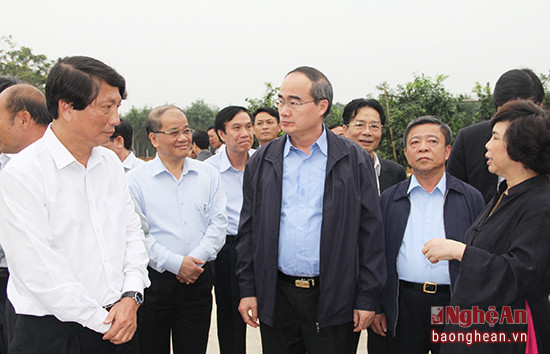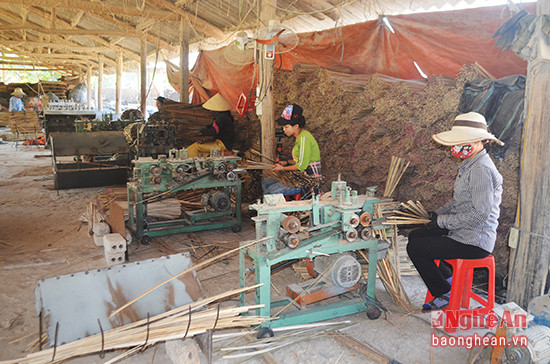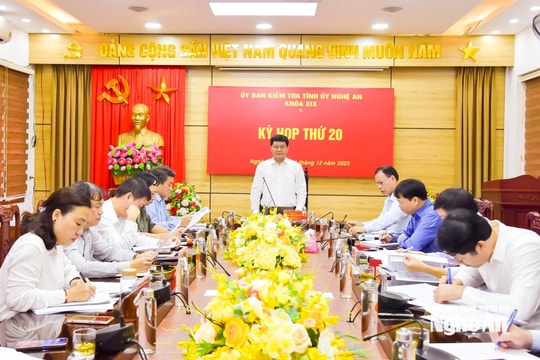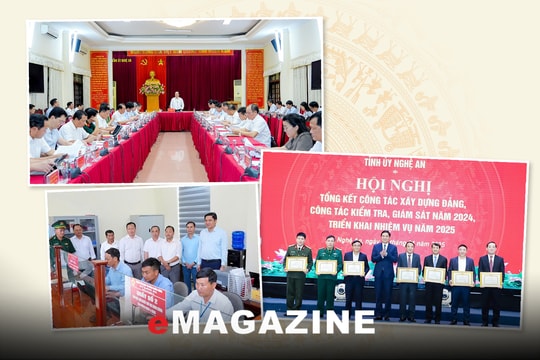Early formation of production unions in agriculture
(Baonghean) - Recently, the working delegation of Comrade Nguyen Thien Nhan - Politburo member, President of the Central Committee of the Vietnam Fatherland Front worked in Nghe An province with the main content being the development of the cooperative economic sector. Nghe An Newspaper had an interview with Comrade Le Phuc An - Chairman of the Provincial Cooperative Union (HTX) about this content.
 |
| Comrade Nguyen Thien Nhan visited the 1/5 fruit tree agricultural cooperative, Nghia Dan district. |
PV:In the process of restructuring the agricultural sector, the role of cooperatives is extremely important. Could you please tell us about the results of cooperative development, especially in the agricultural sector in our province today?
Comrade Le Phuc An:In recent years, the cooperative economy in general, and agricultural cooperatives in particular, in Nghe An province have developed in terms of quantity, quality, scale and form of operation. The whole province currently has 2,906 cooperatives with over 36,000 workers participating, operating in a variety of fields, mainly in the fields of small-scale industry, trade and services, agricultural services, fishing and aquatic services. The income of workers in cooperatives is from 2.5 to 3 million VND/month.
Nghe An has 650 cooperatives with a total of 265,732 cooperative members and more than 52,000 regular workers. Of which, the whole province has 408 agricultural cooperatives and 348 have converted their operations according to the 2012 Law on Cooperatives, 60 have not yet been reorganized, agricultural cooperatives mainly perform services such as: irrigation, supply of materials, plant varieties, plant protection, veterinary medicine, etc.
In addition, some cooperatives have expanded their business lines such as environmental services, providing seedlings for afforestation, providing fertilizer production, processing agricultural and forestry products, internal credit... In fact, the activities of cooperatives in recent times have been effective, organizing economic linkages between individual households, small and fragmented production to move towards large-scale concentrated commodity production, creating competitiveness of goods; at the same time, providing good input services, guiding members and farmers to continue to receive and transfer scientific and technical advances, transforming the structure of crops and livestock towards commodity production, actively contributing to the restructuring of agriculture.
In particular, cooperatives have played an active role in building the new rural areas. According to statistics, in communes that have met the new rural standards, many cooperatives have operated with high efficiency. Typical examples are Nghi Lam Agricultural Cooperative, Nghi Lam Commune (Nghi Loc); Loc Thuy Aquaculture Cooperative, Quynh Bang Commune (Quynh Luu); Lam Cau Agricultural Service Cooperative in Quynh Thach Commune (Quynh Luu), Van Son Agricultural Service Cooperative, Van Son Commune (Do Luong)... These cooperatives have linked with enterprises to provide input services and effectively consume output products.
PV:Working with the province, Comrade Nguyen Thien Nhan - Politburo member, President of the Central Committee of the Vietnam Fatherland Front emphasized the criteria that all communes must have new-style agricultural cooperatives; along with that, reviewing and finding solutions to increase the rate of farmers participating in cooperatives to ensure operational efficiency. So what is the actual situation in Nghe An, Comrade?
Comrade Le Phuc An:Although there are a relatively large number of cooperatives, there are still 129 communes, wards and towns in the province that do not have any cooperatives. The reorganization of agricultural cooperatives according to the 2012 Cooperative Law has not been ensured as planned before June 30, 2016.
Up to now, only 66% of the total 555 cooperatives that must be converted in the province have converted according to the 2012 Law on Cooperatives. For agricultural cooperatives, the quality of services is not high, they are not competitive in the market mechanism, and their economic efficiency is still low. Some cooperatives operating under the 2012 Law on Cooperatives have not really innovated in terms of content and methods. The main reason is that some localities have not really paid attention to the activities of agricultural cooperatives in the area. In the whole province, only 191/650 cooperatives have rented land for headquarters. In particular, access to loans for cooperatives is very difficult. According to our statistics, currently, the whole province has only 22 cooperatives that have access to loans from commercial banks with outstanding loans accounting for only 0.2% of the outstanding loans of the banking system.
PV:The province has identified 2017 as the year to create strong changes in the cooperative economic sector. So what solutions will the Provincial Cooperative Union implement for this goal, sir?
Comrade Le Phuc An:Identifying the development of cooperatives in general, especially new-style cooperatives in agriculture, as a breakthrough to restructure the agricultural sector and increase farmers' income sustainably, we focus on supporting the implementation of "5 readiness" for farmers as pointed out by comrade Nguyen Thien Nhan in the recent working trip.
That is, each commune must have at least 10 farmer households who understand cooperative economics and are ready to participate in cooperative economics; 3/10 of them must be trained to be leaders and managers of cooperatives; must discuss with each other to determine the main products of the cooperative and know the unit that provides technical support; be ready with the method of product consumption; must know the capital support policy.
 |
| Produced at Que Son bamboo processing cooperative (Que Phong). |
Going into specific solutions, the Provincial Cooperative Union focused on widely disseminating the 2012 Law on Cooperatives, emphasizing the role of new-style cooperatives in improving the production efficiency of individual production and business households and providing output for products for cooperative members; at the same time, organizing the introduction of new-style cooperative models that are truly effective in production and business so that people are confident and proactive in self-associating to form new-style cooperatives; at the same time, promptly organizing the commendation and reward of new-style cooperatives that operate effectively to form a movement to build new-style cooperatives and cooperative unions.
In addition, we are interested in promoting consulting, training, and education for leaders and managers of cooperatives; along with that, proactively reviewing and advising on the issuance of key mechanisms such as: early establishment of the Cooperative Support Fund, policies on capital access... to create favorable conditions for the cooperative economy and cooperative development; coordinating construction and connection to form cooperative unions, linking with enterprises to achieve the goal of providing input services at the lowest cost, highest quality and creating stable output, high prices to improve the efficiency of cooperative operations.
Currently, the Provincial Cooperative Union is taking steps to build 1-2 production and consumption unions of agricultural products in 2017. However, to improve the operational efficiency of cooperatives, especially agricultural cooperatives, the Provincial Cooperative Union itself determines that it must proactively coordinate with the Fatherland Front and its members at all levels and related sectors, People's Committees of districts, cities and towns to develop policies; coordinate in building and implementing targets for establishing cooperatives in the whole province. Thereby, specifying the establishment targets for each locality to promote the establishment of cooperatives and the rate of people participating in cooperatives.
Currently, the Department of Agriculture and Rural Development is presiding over and the Provincial Cooperative Union is also a member participating in the development of the project on new rural construction associated with the development of economic sectors, craft villages, craft villages, and high-quality economic models to transform the growth model in agriculture and rural areas in the province in the period of 2016 - 2020. This project is expected to be submitted to the Provincial Party Committee Standing Committee for approval in the coming time.
Once approved, this project is an important basis to promote the construction of new rural areas on the basis of focusing on production development, innovation and development of appropriate forms of production organization, development of cooperative economy, household economy, development of craft villages, craft villages associated with environmental protection, continuing to build economic models applying high technology effectively, to attract labor and create jobs on the spot, increase income, and sustainably reduce poverty.
On the other hand, we also advise to continue to improve the activities of the Provincial Economic Cooperative Steering Committee. With the above comprehensive solutions, we strive to build Nghe An into a typical province in developing cooperative economy and building new rural areas as emphasized by comrade Nguyen Thien Nhan in the recent working session in the province.
PV:Thanks comrade!
Thanh Duy
(Perform)








